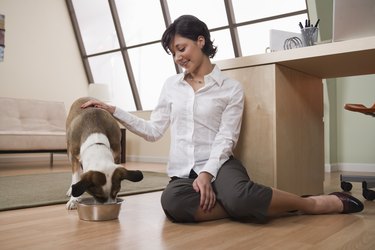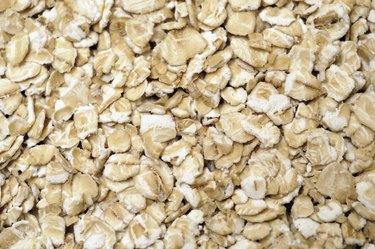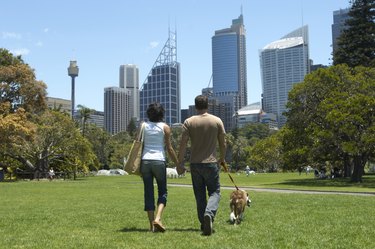
Anal glands are scent glands located around a dog's rectum. When these become impacted they require manual expression of the fluid inside to decrease pressure within the gland and prevent bursting. Manual manipulation of the anal gland is painful for the dog. The process of extraction is also dangerous for dogs as it may allow bacteria to enter the dog's body that otherwise would not have. However, most anal gland problems are easily prevented through proper diet.
Foods
Video of the Day

High fiber diets are imperative to a dog with anal gland problems, because the fiber produces a bulkier stool which puts pressure on the anal gland and causes it to express as the stool is passed. Commercial brands of high fiber foods are available and can even be purchased through your veterinarian. Certain foods which increase fiber content can also be added to the dog's food, including raw sesame seeds, ground flax seed, psyllium seed, buckwheat, whole oats, brown rice, wheat bran, whole grain cereal, or bran flakes. Dry fiber foods must be thoroughly hydrated before serving to your dog, as this will prevent choking or intestinal problems. Some dogs may have an intolerance to wheat, so these dogs should not consume wheat cereals.
Video of the Day
Supplements

Supplements are another way of preventing anal gland problems in your dog. Metamucil is a commercial medication made of psyllium seeds which provides additional fiber to your dog's diet. Fatty acid supplements may be given to encourage the dog's bowel muscles to manually contract. Your veterinarian can recommend supplements and medications specifically for your dog while advising how to use them to improve anal gland health.
Additional Tips

Obesity has a negative effect on anal gland health as well as poor heart, liver, and kidney health. Refrain from overfeeding your dogs no matter what diet you choose. A daily walk (or two) is a great way to exercise your dog and prevent obesity, along with anal gland problems. Daily walks also provide an opportunity for the dog to have a bowel movement and express the anal gland. Allow the dog to go outside every 2 to 3 hours to further encourage bowel movements. Compresses made of cloth with warm water can also be placed on the anal area several times daily to help relieve stress on the anal glands.